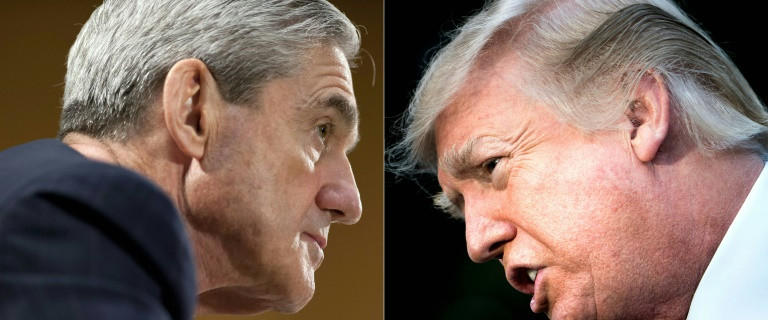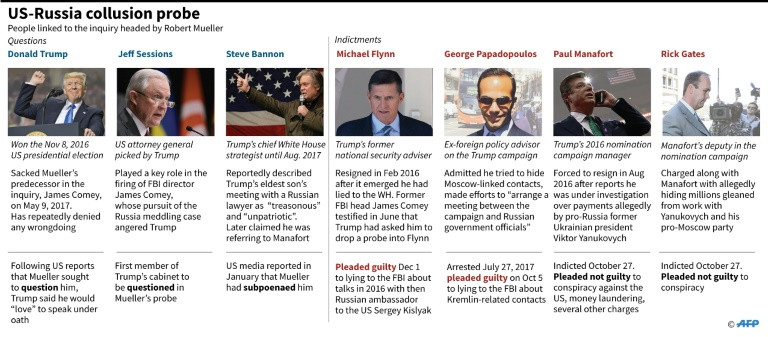
Legal showdown: Russia investigation special prosecutor Robert Mueller (L) and President Donald Trump (R). Photo: AFP/Saul Loeb, Brendan Smialowski
Donald Trump has said he "would love" to be interviewed under oath in special prosecutor Robert Mueller's probe into possible collusion between Trump's presidential campaign and Russia.
But such a meeting, which could happen within weeks, is fraught with risks for the US president.
- Mueller's broad mandate -
Mueller, 73, is a methodical former FBI director with a strong image of probity and political independence. On May 17, 2017, he was assigned a broad brief to investigate anything linked to Russian meddling during the election.
His team of top-notch lawyers and investigators are expert in everything from corruption and money laundering to flipping mafia witnesses to Supreme Court legal showdowns.
Their focus is two-fold:
-- Did the Trump campaign collude with Russia's efforts to influence the election, which included leaking hacked Democrat files and communications and an extensive misinformation campaign?
-- Did Trump try to illegally obstruct the collusion investigation, via public comments and the firing of FBI director James Comey in early 2017?
- How close is he to Trump? -
Mueller's team has spent the past eight months interviewing members of Trump's campaign and White House staff, his family, and former government officials.

US-Russia collusion probe. Photo: AFP/John Saeki
Interviewees include Comey, former acting attorney general Sally Yates, current Attorney General Jeff Sessions, Trump's son-in-law Jared Kushner, CIA Director Mike Pompeo, former White House chief of staff Reince Priebus, and White House communications director Hope Hicks -- one of Trump's closest aides.
The result, so far, has been four indictments and two guilty pleas. On October 30 Mueller unveiled charges against former Trump campaign chairman Paul Manafort and his deputy Richard Gates, for money-laundering and related financial crimes that occurred before Trump ran for election.
The same day he extracted a guilty plea for lying, and a pledge to cooperate, from George Papadopoulos, a campaign aide who had tried to arrange a meeting between candidate Trump and Russian President Vladimir Putin.
On December 2, former Trump national security advisor Michael Flynn, who had multiple communications and meetings with Russian figures, pleaded guilty to a single charge of lying to investigators. Flynn, a right-hand man of the new president until he was forced to resign after 24 days on the job, is now assumed to be cooperating with the investigation.
- The risks of testifying -
The timing and parameters of Trump's engagement with Mueller aren't set yet. It could involve providing written answers to written questions, or a face-to-face interview, or a mix of the two.
Lawyers on both sides are negotiating the issue, which from the White House view, involves protecting the president's executive privilege -- which can set limits on how much and in what context the US leader can be forced to disclose information.
Still, Trump faces huge risks. He likely does not know the full extent of what others from the campaign have told Mueller, and any discrepancy could expose him to accusations of lying -- the charge that led to president Bill Clinton's 1998 impeachment.
Mueller will want to ask what Trump knew about a June 2016 meeting between top campaign staff and family members and a Russian lawyer offering dirt on election rival Hillary Clinton. He will want to know if Trump knew about Papadopoulos's Russian contacts. And also about the campaign's contacts with WikiLeaks, which published emails damaging to Clinton.
Trump risks exacerbating matters with his uncensored comments in public and on Twitter, which his staff and lawyers have not always been able to control.
Critics say his numerous unscripted remarks about the investigation, how he handled Comey's firing, and attacks on the FBI, have already shown ample evidence of obstruction, the charge that forced president Richard Nixon to resign in the Watergate scandal.
- Damned either way: Mueller's challenge -
An interview with Trump does not necessarily signal the end of the probe. Knowledge of contacts with Russians is not collusion. And Twitter rants about the investigations are not, by themselves, evidence of obstruction.
If Mueller ultimately does not find collusion or obstruction charges against Trump, Democrats will cry foul, pointing to the Comey firing as obvious evidence.
But Mueller has a very high evidentiary bar to top if he is to recommend impeachment charges to the US Congress. Congress, meanwhile, is dominated by Republicans who are working hard to prove that Mueller's team and the FBI are full of Trump-hating Democrats. If that charge sticks, it could weaken the impact of Mueller's conclusions.


